| Oracle® Communications EAGLE Database Administration - GTT User's Guide Release 46.7 E97332-02 |
|
 Previous |
 Next |
| Oracle® Communications EAGLE Database Administration - GTT User's Guide Release 46.7 E97332-02 |
|
 Previous |
 Next |
Flexible Linkset Optional Based Routing allows the EAGLE to route GTT traffic based on the incoming link set and to route GTT traffic based on a variety of parameters (MTP, SCCP and TCAP depending on features that are enabled and turned on) in a flexible order on a per-translation basis.
Flexible Linkset Optional Based Routing can be used with or without the Origin-Based SCCP Routing or the TCAP Opcode Based Routing features. Flexible Linkset Optional Based Routing can be enabled and turned on only if the EGTT feature is turned on. If only the Flexible Linkset Optional Based Routing is enabled and turned on, the name of the incoming linkset that will help to determine how the GTT traffic is routed can be provisioned in the GTT selectors. If the Origin-Based SCCP Routing feature or the TCAP Opcode Based Routing feature is used with the Flexible Linkset Optional Based Routing feature, the name of the incoming linkset can be provisioned along with the provisioning for the Origin-Based SCCP Routing or the TCAP Opcode Based Routing features. Table 2-7 shows the type of GTT sets that can be provisioned for GTT selectors based on the features that are enabled and turned on.
Table 2-7 GTT Set Type and GTT Selector Combinations
| Feature Combinations | GTT Set Types for CdPA GTT Selectors | GTT Set Types for CgPA GTT Selectors |
|---|---|---|
| EGTT Only | CdPA GTA | Not Applicable |
| Origin-Based SCCP Based Routing Only | CdPA GTA | CgPA GTA, CgPA Point Code |
| Flexible Linkset Optional Based Routing Only | CdPA GTA, CdPA SSN, DPC | CdPA GTA, CdPA SSN, DPC |
| Flexible Linkset Optional Based Routing and TCAP Opcode Based Routing | CdPA GTA, Opcode, CdPA SSN, DPC | CdPA GTA, Opcode, CdPA SSN, DPC |
| Flexible Linkset Optional Based Routing and Origin-Based SCCP Based Routing | CdPA GTA, CgPA GTA, CgPA SSN, CgPA Point Code, OPC, CdPA SSN, DPC | CdPA GTA, CgPA GTA, CgPA SSN, CgPA Point Code, OPC, CdPA SSN, DPC |
| Flexible Linkset Optional Based Routing, Origin-Based SCCP Based Routing, and TCAP Opcode Based Routing | CdPA GTA, CgPA GTA, CgPA SSN, CgPA Point Code, OPC, Opcode, CdPA SSN, DPC | CdPA GTA, CgPA GTA, CgPA SSN, CgPA Point Code, OPC, Opcode, CdPA SSN, DPC |
Enhancements to Flexible Linkset Optional Based Routing
In previous releases, the GTT and TT command sets were replaced by the GTTSET, GTTSEL, and GTA command sets when the EGTT feature is turned on. Now the GTT and TT command sets can be used when EGTT feature is turned on.
In previous releases, the
selid parameter in the
ent-gttsel,
dlt-gttsel, and
chg-gttsel commands could be configured
only when the Flexible Linkset Optional Based Routing feature is enabled and
turned on or the Origin-Based SCCP Routing feature is enabled. Now the
selid parameter of these commands can be
configured when the EGTT feature is turned on.
An SCCP message (RT-on-GT or MTP-routed) received by the EAGLE can be routed (Relayed or Redirected) to another destination based on the routing data obtained from the EPAP database or PPSOPTS table by the EPAP-based service. This type of message is called a Service Relayed MSU. In previous releases, global title translation is not performed on Service Relayed MSUs. These messages are directly sent to destination obtained from EPAP database or PPSOPTS table.
Now global title translation can be performed Service
Relayed MSUs. To do this, these three optional parameters of the
ent-srvsel and
chg-srvsel commands are supported on per
Service Selector basis for the non-GTT Message Relay Services.
on=gttrqd,
off=gttrqd) – This specifies whether
or not global title translation is performed on Service Relayed MSUs. This
parameter can be configured after the GTT feature is turned on.
gttselid for the
ent-srvsel command,
ngttselid for the
chg-srvsel command) – This is used as
the SELID value for the GTT selector search when global title translation is
performed on the Service Relayed MSU. This parameter can be configured only
after EGTT feature is turned on.
dfltact for the
ent-srvsel command,
ndfltact for the
chg-srvsel command) – The action that
is performed when the GTT selector search (using the GTT Selector ID from the
Service Selector entry) fails for the Service Relayed MSU. This parameter can
be configured only after EGTT feature is turned on or the GTT Action - DISCARD
feature is enabled and turned on.
An example service selector entry is shown in Figure 2-5.
Figure 2-5 Message Relay Services and GTT Actions

The GTT Required option indicates whether global title translation needs to be performed after successfully finding the routing data from the EPAP database or PPSOPTS database for non-GTT Message Relay Services. If the routing data is not found for non-GTT Relay Services from the EPAP database or PPSOPTS database, the standard Fall through to GTT procedure shall be performed.
Fallback to GTT
Fallback to GTT allows global title translation to be performed on Service Relayed MSUs by using the GTT Required parameter on per Service Selector basis for the non-GTT Message Relay Services shown in Table 2-8. Provisioning of the GTT Required parameter can be performed only if the EAGLE contains E5-SM4G cards.
Table 2-8 Services Supporting Fallback to GTT
| Service Name | Corresponding Feature which may relay MSU-based on EPAP or PPSOPTS Data |
|---|---|
| MNP/GPORT |
GPORT (Part Number: 893-0172-01) APORT (Part Number: 893-0166-01) IS41 GSM Migration (Part Number: 893-0173-01) |
| SMSMR | Prepaid SMS Intercept Ph1 (Part Number: 893-0067-01) |
| GFLEX |
G-Flex MAP Layer Routing (Part Number: 893-0217-01) G-Flex (Part Number: 893-0219-01) |
| INPMR |
ANSI-41 INP Query (Part Number: 893-0178-01) INP (Part Number: 893-0179-01) |
| IDPR |
IDP A-Party Routing (Part Number: 893-0333-01) IDP Service Key Routing (Part Number: 893-0336-01) |
| TTR | Currently no feature in this service performs message relay without encountering global title translation. The GTT Required parameter has no effect on this service. |
The GTT Required parameter is invoked only if a message is required to be relayed based on the routing data from EPAP database or PPSOPTS table after the successful execution of a non-GTT Message Relay Service. Table 2-8 lists the non-GTT Message Relay Services and the corresponding feature(s) which may result in the message being relayed based on the routing data from EPAP database or PPSOPTS table. If the GTT Required parameter value indicates that global title translation is required on the Service Relayed MSU, then global title translation is performed on the MSU modified by the relay service according to GTT hierarchy of the incoming link set. The default value of GTT Required parameter is set to indicate that global title translation is not required on the Service Relayed MSU. If global title translation is performed on the Service Relayed MSU successfully, then the message is processed through all the GTT-related features that are enabled and turned on.
Note:
Fallback to GTT applies only to the Service Relayed MSU. Query/Response and standard Fall Through to GTT procedures are do not apply to Fallback to GTT.Exceptions to Fallback to GTT
If a service performs global title translation on service specific parameters to obtain information required for message routing (for example, the MO SMS B-Party Routing feature in the SMSMR service finds the routing information by performing global title translation on the CDPN), then Fallback to GTT is not applied on those messages. The exceptions to Fallback to GTT are shown in Table 2-9.
Table 2-9 Exceptions to Fallback to GTT
| Service Name | Feature Name | Exception Description |
|---|---|---|
| MNP/GPORT |
IS41 GSM Migration (Part Number: 893-0173-01) |
The IGM SRI_SM Relay to Default IS41 SMSC functionality relays
the message to the default IS41 SMSC based on the global title translation of
the GTA defined by the
DEFIS41SMSC value shown in the
rtrv-gsmsmsopts output.
|
| All features under the MNP/GPORT service. | The MNP/GPORT service allows re-routing of messages when the service is offline. In this case, a global title translation parameter is already present that specifies whether global title translation is required when the service is offline. | |
| SMSMR |
MO SMS B-Party Routing (Part Number: 893-0246-01) |
MO SMS B-Party Routing performs global title translation on the TCAP B-Party digits (TCAP CDPN) and routes the message based on the global title translation results. |
| GFLEX | All features under the GFLEX service. | The GFLEX service allows re-routing of messages when the GFLEX service is offline. In this case, a global title translation parameter is already present that specifies whether global title translation is required when the service is offline. |
The service selector search is not performed for the MTP-routed messages whose CDPA GTI value is 0 (zero). The parameters required to perform Fallback to GTT are not available for MTP-routed messages whose CDPA GTI value is 0 (zero). Fallback to GTT on Service Relayed MSUs does not apply to messages whose CDPA GTI value is 0 (zero). If a message whose CDPA GTI value is 0 (zero) is relayed by an EPAP-based service, then global title translation is not be performed on the message.
GTT Selector ID and the Service Selector
For the non-GTT Message Relay Services, shown in
Table 2-8,
GTT selector IDs (SELIDs) can be provisioned. Only one GTT selector ID is
allowed for each service selector entry. The GTT selector ID is used to perform
GTT selector searches while performing global title translation on the Service
Relayed MSUs. The GTT selector ID is not used while performing global title
translation as a part of the existing Fall through to GTT message processing.
The GTT selector ID from service selector shall be used only in first GTT
selector search. If further GTT selector searches are required (when the
matching translation is provisioned with a CDSELID or CGSELID), then the GTT
selector ID found from the previous matched translation is used as is currently
done when processing the translation for the Origin-Based SCCP Routing and
Flexible Linkset Optional Based Routing features. The default value for the GTT
selector ID in the service selector entry is
none. The GTT selector ID in the service
selector can be provisioned when the EGTT feature is on. The Origin-Based SCCP
Routing and Flexible Linkset Optional Based Routing features are not required
to be enabled or turned on to provision the GTT selector ID in the service
selector.
Default Action and the Service Selector
For the non-GTT Message Relay Services shown in Table 2-8, a default action can be provisioned for each service selector entry. The default action parameter in the service selector can be one of these values.
The default action from the service selector is used only if the GTT selector search using the GTT selector ID from the service selector fails while performing global title translation on the Service Relayed MSU.
If the GTT selector search using the GTT selector ID from
the service selector fails and the default action in the service selector is
Fall through to GTT, then the action that is performed depends on the value of
the GTT selector ID in the service selector. If the GTT selector ID value in
the service selector is
none, then the message is discarded and
UIM 1042 is generated. If the GTT selector ID value in the service selector is
not
none, then the GTT selector search is
attempted again with GTT selector ID value of
none. If the subsequent GTT selector
search, attempted with GTT selector ID value of
none, also fails, then the message is
discarded and UIM 1042 is generated.
If the GTT selector search using the GTT selector ID from the service selector fails and the default action value in the service selector is either the Discard GTT Action ID, UDTS GTT Action ID, or the TCAP Error GTT Action ID, then the corresponding GTT action is performed.
If the GTT selector search using the GTT selector ID from the service selector fails and the default action value in the service selector is Fallback, then the message is relayed based on the routing data from the EPAP database or PPSOPTS table.
Overall Functionality
After successfully getting the routing data for non-GTT
Message Relay Services, if the GTT Required value is set to
Yes and the GTT SELID is provisioned for
this service, global title translation is performed on the MSU with specified
SELID value to find the matching translation based on the GTT hierarchy on the
linkset on which this MSU arrived.
xlat parameter value is
none), the MSU continues to use
the EPAP or PPSOPTS routing data.
cggtmod or
gtmodid parameters, then the
cggtmod parameter value or the
parameter values contained in the GT modification entry that is defined by the
gtmodid parameter are applied to
the MSU.
ccgt parameter, then the
ccgt parameter value is applied to
the MSU as is currently done with the Advanced GT Modification feature.
Linkset Based Routing
After the Flexible Linkset Optional Based Routing feature enabled and turned on, Eagle considers the incoming link set as part of the GTT selection process for performing global title translation. If EAGLE receives MSUs with the same routing information on different link sets, it has the flexibility to route them based on different GTT rules. This also applies to the messages that fall through to GTT after being processed by MPS based services on the EAGLE. The incoming link set of the original MSU is used for these messages.
MSUs generated by the EAGLE that require global title translation are handled differently since they do not have a valid incoming link set. A separate set of GTT selector entries can be provisioned for these MSUs.
A separate set of GTT selector entries can be provisioned for messages generated by the EAGLE.
Flexible Linkset Optional Based Routing GTT Hierarchies
The Flexible Linkset Optional Based Routing feature introduced four more GTT hierarchies in addition to the GTT hierarchies used for the Origin-Based SCCP Routing feature. These hierarchies are shown in Table 2-10. These GTT hierarchies are available only when the corresponding feature is enabled, and turned on if necessary. All the GTT hierarchies are available when both the Origin-Based SCCP Routing and the Flexible Linkset Optional Based Routing features are enabled, and turned on if necessary. The GTT hierarchy can be provisioned on a link set basis or a system wide basis. The default GTT hierarchy is CdPA only.
Table 2-10 GTT Hierarchies
| EGTT Turned On Only | Origin-Based SCCP Routing Enabled Only | Flexible Linkset Optional Based Routing (FLOBR) Enabled and Turned On Only | Origin-Based SCCP Routing Enabled and Flexible Linkset Optional Based Routing Enabled and Turned On |
|---|---|---|---|
| CdPA only |
CdPA only Advanced CdPA, CdPA CgPA, Advanced CdPA, CdPA Advanced CdPA, CdPA, CgPA CgPA, CdPA CdPA, CgPA CgPA only |
CdPA only FLOBR CdPA only FLOBR CgPA only FLOBR CgPA, FLOBR CdPA FLOBR CdPA, FLOBR CgPA |
CdPA only Advanced CdPA, CdPA CgPA, Advanced CdPA, CdPA Advanced CdPA, CdPA, CgPA CgPA, CdPA CdPA, CgPA CgPA only FLOBR CdPA only FLOBR CgPA only FLOBR CgPA, FLOBR CdPA FLOBR CdPA, FLOBR CgPA |
Note:
The DPC and CDSSN GTT set types can be searched only in a Flexible Linkset Optional Based Routing GTT hierarchy.Fallback Option
dfltfallback parameter of the
chg-sccpopts command and is used to
define the default value (“No”) for all translations by default. Each
translation may then be configured to use one of the fallback values. The
fallback option is configured with the
fallback parameter of the
ent-gta or
chg-gta commands. The
fallback parameter has these values.
sysdflt - use the
dfltfallback parameter value of the
chg-sccpopts command for the
translation.
yes - global title
translation is performed based on the last matched entry.
no - global title
translation fails and the MSU is discarded.
The per-translation option overrides the system default just for that translation. The Origin-Based SCCP Routing hierarchies do not use the fallback option.
Routing when the Subsequent GTT Set Search Failed
In this example, Set 1 is used to start the search. The matching translation in Set 1 points to Set 2. The matching translation in Set 2 points to Set 3 and there is no matching translation found in Set 3. Since the fallback option for the matched translation in Set 2 set to No, the MSU is discarded.
Figure 2-6 Action When the Subsequent Translation Search Fails
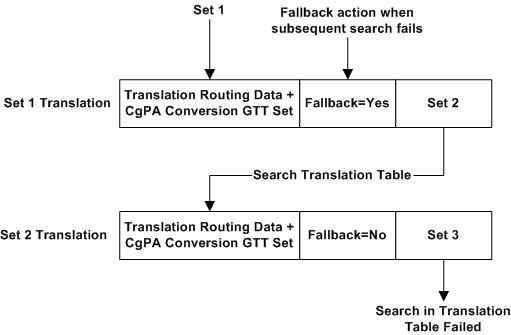
If the matching translation is not found in Set 2 (Set 2 Translation in Figure 2-6 is not found) and since the fallback option value in the Set 1 Translation is set to Yes, the MSU is routed based on the routing data in the Set 1 Translation. If the matching translation in Set 2 does not contain any GTT set/SELID combination (the Set 3 GTT set as shown in Figure 2-6 is not provisioned), then the fallback option is ignored and the MSU is routed based on routing data in the Set 2 Translation. If the matching translation in Set 1 is not found, then the GTT process fails.
Routing When the Subsequent Search for the SELID Fails
In this example, Set 1 is used to start the search. The matching translation in Set 1 (for example, a CdPA SSN/Opcode/CdPA GTA translation) contains SELID/Set 2 and also Set 3 (in this case Set 3 is an OPC GTT set).
Figure 2-7 Action When the Subsequent SELID Search Fails
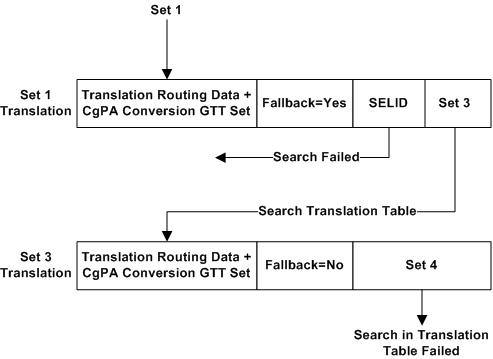
If a matching GTT selector is not found with an SELID in the Set 1 translation, the search continues searching for the matching translation in Set 3. If a matching translation is found in Set 3 and no matching translation is found in Set 4, the fallback option No in the Set 3 Translation is performed and the MSU is discarded. If a matching GTT selector is not found with an SELID in the Set 1 translation and a matching translation is not found in Set 3, the fallback option Yes in the Set 1 Translation is performed and the MSU is routed based on the routing data in the Set 1 Translation. If a GTT selector with an SELID results in a GTT set name that is already referred to, the action based on the fallback option in the Set 1 Translation is performed.
Routing When the Same GTT Set Name is Referred To More than Once
Figure 2-8 Action When the Same GTT Set Name is Referred to More Than Once
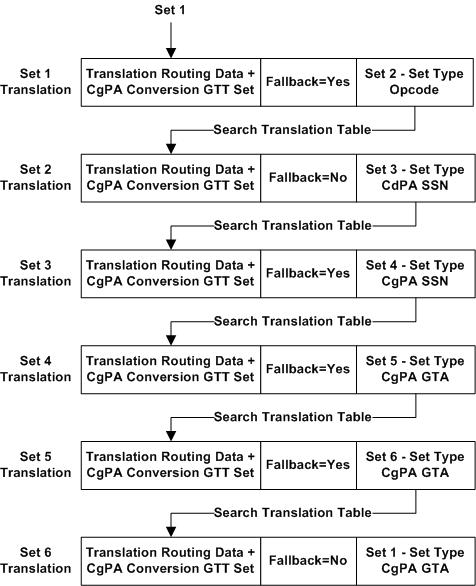
In
Figure 2-8,
even if the Set 5 Translation contains the Set 6 GTT set (Set 5 and Set 6 are
that same type of GTT sets), the Set 6 Translation will be searched for the
matching translation. If the Set 6 Translation contains the Set 1 GTT set and
since Set 1 has already searched, the Set 1 translation is not searched again
and the fallback option of the last matched translation is examined. Since the
last matched translation is found in Set 6 and the fallback option is set to
No, the MSU is discarded. UIM 1413 -
GTT(FLOBR) failure: duplicate set name
is generated to describe the condition. In
Figure 2-8,
if the Set 6 Translation was not found and since the fallback option in the Set
5 Translation is set to Yes, the MSU is routed based on the data in the Set 5
Translation.
Limiting the Number of Database Searches for the Flexible Linkset Optional Based Routing Feature
The number of database searches is limited to seven when the Flexible Linkset Optional Based Routing feature is enabled and turned on. This includes searching the GTT selector table when a translation contains the CgPA SELID or CdPA SELID parameter.
Figure 2-9 Limit the Number of Database Searches
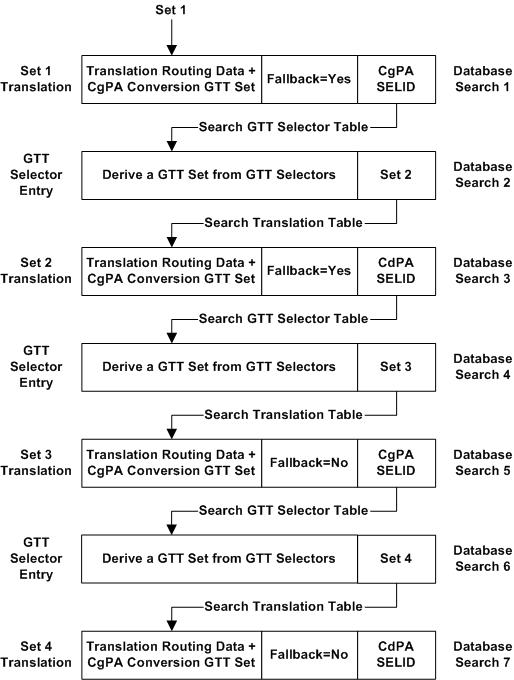
As shown in
Figure 2-9,
when a translation contains the CdPA SELID or CgPA SELID, the search in the GTT
selector table is also counted toward the maximum seven searches. After
completing seven searches, if the search is terminated because of the maximum
seven search criteria, the action defined in the last matched Set 4 Translation
fallback option (in this case No) is performed and MSU is discarded. UIM 1412 -
GTT (FLOBR) failure: max search depth is
generated to describe the condition. After completing seven searches, if the
last matched translation contains no GTT set/SELID data (if the CdPA SELID data
is not provisioned in the Set 4 Translation), the MSU is routed based on the
routing data in the Set 4 Translation. The first GTT selector search when the
GTT functionality is selected (deriving Set 1 in
Figure 2-9)
is not counted toward the maximum seven search criteria.
Limiting the Number of GTT Set Searches for the Flexible Linkset Optional Based Routing Feature
The number of GTT set searches is limited to seven when the Flexible Linkset Optional Based Routing feature is enabled and turned on.
Figure 2-10 Limit the Number of GTT Set Searches
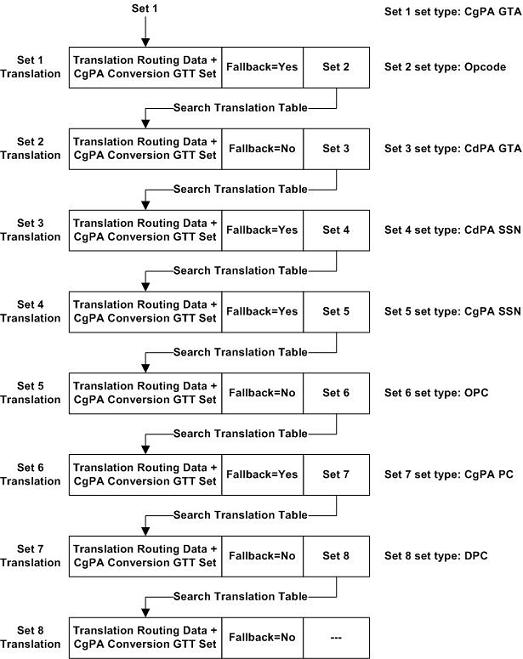
As shown in
Figure 2-10,
after completing seven GTT set searches, if the search is terminated because of
the maximum of seven searches have been performed, the action defined by the
fallback option in Set 7 Translation, in this case No, is performed and the MSU
is discarded. UIM 1412 -
GTT(FLOBR) failure: max search depth is
generated to describe the condition. If the Set 7 Translation contains no GTT
sets, Set 8 is this case, the MSU is routed based on the routing data in the
Set 7 Translation.
GTT for MSUs Generated by the EAGLE
The EAGLE performs global title translation on some
messages generated by itself. These messages are sent in response to queries
received by local subsystems. SCCP UDTS and XUDTS messages also fall under this
category. Global title translation is performed to find the destination for the
responses when the SCCP calling party address in query messages is Route-on-GT.
Since there is no valid incoming link set for messages generated by the EAGLE,
a special set of GTT selector entries are used when the Flexible Linkset
Optional Based Routing feature is enabled and turned on. The
eaglegen=yes parameter in the
ent-/dlt-/chg-/rtrv-gttsel commands is used to provision a GTT
selector for messages generated by the EAGLE. If the
eaglegen=no parameter is specified for a
GTT selector, the GTT selector is not provisioned for messages generated by the
EAGLE.
eaglegen=yes parameter is specified for
a GTT selector,
Eagle-Gen is displayed in the
rtrv-gttsel command output.
If the GTT set name assigned to a GTT selector for
messages generated by the EAGLE is changed with the
chg-gttsel command, the new GTT set must
be a CdPA GTT set.
If no match is found in the GTT selector entries that
contain the
eaglegen=yes parameter, the entries with
LSN value
ANY are searched. If a matching entry is
still not found, for GTI=4 entries, the GTT set with CdPA set type for NP and
NAI values Default are returned. For GTI=2 entries, a match not found message
is returned. The Flexible Linkset Optional Based Routing feature hierarchies do
not apply for GTT selectors provisioned for messages generated by the EAGLE and
the CDPA Only GTT mode is used for such translations.
GTT Selector Key
Table 2-11 defines the keys into GTT selector table based on the feature combination. If a feature supports specific parameters and that feature is not enabled or turned, if necessary, then default values for these parameters are entered into the database.
Table 2-11 GTT Selector Key
| Feature Combination | Selector Type | GTI, Domain, TT, (NP and NAI if the GTII/GTIN/GTIN24=4) | CgPA SSN | SELID | Linkset Name |
|---|---|---|---|---|---|
| EGTT | CdPA Only | X | - |
X (See Note 1) |
- |
| Origin-Based SCCP Routing | CdPA | X | - |
X (See Note 1) |
- |
| CgPA | X | X | X | - | |
| Flexible Linkset Optional Based Routing | CdPA | X | - | X | X |
| CgPA | X | - | X | X | |
| Origin-Based SCCP Routing and Flexible Linkset Optional Based Routing | CdPA | X | - | X | X |
| CgPA | X | X | X | X | |
| Messages generated by the EAGLE | CdPA only | X | - | - |
X (See Note 2) |
|
Note:
|
|||||
Searching Order in the GTT Selector Table with the Flexible Linkset Optional Based Routing Feature
Table 2-12 CdPA GTT Selector Keys
| Priority | GTI, Domain, TT, (NP and NAI if the GTII/GTIN/GTIN24=4) | Linkset Name | SELID | CdPA GTT Selector Found or Not Found |
|---|---|---|---|---|
| 1 | Exact | Exact | Exact | If a CdPA GTT set is provisioned for the GTT selector keys, the GTT selector is considered found. Otherwise, the GTT selector is not found. See the Note. |
| 2 | Exact | Any | Exact | |
| Note: If an Origin-Based SCCP Routing GTT hierarchy is being used, the CdPA GTT set must be a CDGTA GTT set and the CgPA GTT set must be either a CGGTA or CGPC GTT set. If a Flexible Linkset Optional Based Routing feature GTT hierarchy is being used, any GTT set type can be used. | ||||
Table 2-13 CgPA GTT Selector Keys
| Priority | GTI, Domain, TT, (NP and NAI if the GTII/GTIN/GTIN24=4) | Linkset Name | SELID | CgPA SSN | CgPA GTT Selector Found or Not Found |
|---|---|---|---|---|---|
| 1 | Exact | Exact | Exact | Exact | If a CgPA GTT set is provisioned for the GTT selector keys, the GTT selector is considered found. Otherwise, the GTT selector is not found. See the Note. |
| 2 | Exact | Exact | Exact | Any | |
| 3 | Exact | Any | Exact | Exact | |
| 4 | Exact | Any | Exact | Any | |
| Note: If an Origin-Based SCCP Routing GTT hierarchy is being used, the CdPA GTT set must be a CDGTA GTT set and the CgPA GTT set must be either a CGGTA or CGPC GTT set. If a Flexible Linkset Optional Based Routing feature GTT hierarchy is being used, any GTT set type can be used. | |||||
Table 2-14 Messages Generated by the EAGLE GTT Selector Keys
| Priority | GTI, Domain, TT, (NP and NAI if the GTII/GTIN/GTIN24=4) | Linkset Name | Messages Generated by the EAGLE GTT Selector Found or Not Found |
|---|---|---|---|
| 1 | Exact | Eagle=Gen | If a CdPA GTT set with the CDGTA GTT set type is provisioned for the GTT selector keys, the GTT selector is considered found. Otherwise, the GTT selector is not found. See the Note. |
| 2 | Exact | Any | |
| 3 | For GTI=4, the GTT set with the values Default for the NP and NAI parameters. | Any | |
| Note: If an Origin-Based SCCP Routing GTT hierarchy is being used, the CdPA GTT set must be a CDGTA GTT set and the CgPA GTT set must be either a CGGTA or CGPC GTT set. If a Flexible Linkset Optional Based Routing feature GTT hierarchy is being used, any GTT set type can be used. | |||
Hardware Requirements
To enable the Flexible Linkset Optional Based Routing feature DSM or SLIC cards must be provisioned in the database. Any Legacy Cards must be replaced.
Provisioning the Flexible Linkset Optional Based Routing Feature
To provision the Flexible Linkset Optional Based Routing feature, perform these steps.
chg-feat command. Add the required DSM
or SLIC cards to the database using the
ent-card command. Perform
Adding a Service Module.
enable-ctrl-feat and the
chg-ctrl-feat commands. Perform
Activating the Flexible Linkset Optional Based Routing Feature.
ent-gttset command. Perform
Adding a GTT Set.
ent-gta command. Perform
Adding Global Title Address Information.
ent-gttsel command. Perform
Adding a GTT Selector.
chg-sccpopts command. Perform
Changing the Default GTT Mode Options.